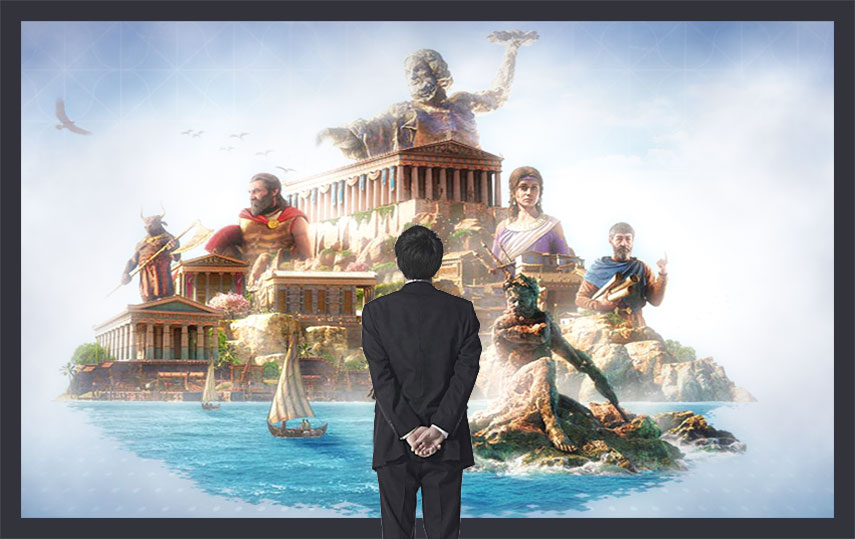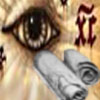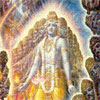Reincarnation In History
 by Roger Woolger, Ph.D.
by Roger Woolger, Ph.D.
Not long ago, I saw a slogan on a bumper sticker: “Reincarnation is having a comeback.” It is a sad fact that the scientific establishment in the United States still marginalizes most work that even hints at realities beyond our own, including regression therapy, parapsychology, and a vast body of research into paranormal phenomena, from out-of-body experiences to children’s spontaneous past-life memories. By clinging to such a narrow protocol, mainstream psychology risks becoming, in George Orwell’s memorable phrase, one of “the smelly little orthodoxies which are now contending for our souls.” Fortunately, in most countries where I have lectured, the general public is far ahead of the academics. Nearly everyone has heard of the doctrine of reincarnation, and recent polls show that almost one in three Americans now believe in it, even though most of the Christian churches reject it.
In recent years, a number of influences have brought past lives into present consciousness. The widely read writings of Edgar Cayce, for example, have been surprisingly influential in America, lending credence to the idea that past lives can contribute to illness, emotional difficulties, relationship difficulties, and so on. (I say “surprisingly” because Cayce channeled thousands of past-life readings while in a trance state, even though his fundamentalist Christian conscious self did not initially believe in past lives!) Many people, thanks to Cayce, now understand the idea of karma as the spiritual fallout of good or bad behavior from the soul’s past. Still others have encountered Hindu teachings, in which the idea of reincarnation is central, or by being exposed to yoga, or by reading the popular works of authors such as Caroline Myss and Barbara Brennan on the chakras, the subtle bodies, and energy medicine. The famous Hindu text The Bhagavad-Gita is for sale today in nearly every bookstore.
And who would have expected to see the Dalai Lama vying with the Pope in the bestseller lists? The high-profile presence of Tibetan Buddhist lamas throughout America and the world has profoundly altered the spiritual landscape of Western society. The making of a film like Little Buddha, with its story of a Tibetan lama reborn in the body of a young American boy, would have been unthinkable in Hollywood a generation ago, but now it receives huge acclaim. Nor does an actor like Richard Gere hesitate to profess his Buddhist affiliations publicly. Many people, myself included, have turned to meditation and radically changed our lifestyles after exposure to these powerful emissaries of ancient wisdom.
WHO BELIEVES IN REINCARNATION?
A better question might be, “Who doesn’t?” The influx of traditional teachers and teachings from the East clearly accounts in part for our shifting attitudes toward reincarnation, but over the centuries the West has had many distinguished believers of its own. Take the following delightful example:
The body of B. Franklin,
Printer,
Like the Cover of an Old Book,
Its Contents Torn Out
And
Stripped of its Lettering and Gilding,
Lies Here,
Food for Worms
But the Work shall not be Lost,
For it Will as He Believed
Appear Once More
In a New and more Elegant Edition
Revised and Corrected
By the Author
Benjamin Franklin’s witty epitaph for himself, written supposedly when he was twenty-one, was never used on his tombstone, but it remains one of the most succinct and memorable summaries of the idea of reincarnation ever penned. Franklin did not have his tongue in his cheek, either. At eighty-eight, he wrote to a friend, “I look upon death to be as necessary to the constitution as sleep. We shall rise refreshed in the morning.”
Nor was Franklin the only famous Westerner to believe that the soul not only survives death but returns in a new body to continue or to rectify the life previously lived on earth. Evidence of this belief can be found in the writings of poets, writers, and philosophers across centuries: Dante Alighieri, Marsilio Ficino, Paracelsus, William Shakespeare, Johann Wolfgang von Goethe, William Wordsworth, Emanuel Swedenborg, David Hume, Arthur Schopenhauer, George Sand, Walter Scott, Victor Hugo, Ralph Waldo Emerson, Richard Wagner, Walt Whitman, Emily Dickinson, W.B. Yeats, Aldous Huxley, Somerset Maugham, D.H. Lawrence, Rainer Maria Rilke, Pearl S. Buck, Carl Jung, Winston Churchill, Norman Mailer, and Shirley MacLaine.
REINCARNATION, CHRISTIANITY, AND PAGANISM
Reincarnation has never officially been condoned by the Catholic Church or any of the major Protestant churches, but it was an almost universal belief among the many Gnostic and pagan sects that proliferated in the first three centuries of our era. Most educated Greeks and Romans of the Hellenic period subscribed to it, especially those initiated into the great Mystery schools of Eleusis, Mithras, Dionysus, or Osiris. We find it in the teachings of the Pythagorean brotherhood, an offshoot of the Orphic mysteries, and, of course, in the doctrines Plato taught in his famous Academy. The philosopher and initiate Plutarch, who became a priest at Delphi, wrote, “We know that the soul is indestructible and should think of its experience as like that of a bird in a cage. If it has been kept in a body for a long time and become tamed to this life as a result of all sorts of involvements and long habituation, it will alight back to a body again after birth and will never stop becoming entangled in the passions and chances of this world.”
Many surviving Gnostic writings, whose origins are hotly debated by scholars, show striking similarities to Buddhist and Hindu teachings about the soul’s journey after death, no doubt because of many centuries of contact between Eastern and Western cultures following the conquests of Alexander the Great. (It is known, for example, that Buddhists taught in Alexandria and that yogis reached Athens, where they were dubbed the gymnophysicists.)
Before the third century C.E., pagan and early Christian beliefs existed side by side in the Roman Empire, but when the emperor Constantine adopted Christianity as the religion of the state, the Gnostics and the Mystery schools came into persecution, and reincarnation was seen as a heresy. Reincarnation was finally excised from Roman Church thinking in 553, when the teachings of Origen about the preexistence of the soul were anathematized by the emperor Justinian. After this, it disappeared from Church history for nearly one thousand years, briefly entering Europe as part of the teachings of the Cathars, the late Gnostic group that flourished in Northern Italy and Southern France in the twelfth and thirteenth centuries. Considered a threat to orthodoxy, the Cathars were brutally extirpated by the Church in the notorious Albigensian Crusade, which spawned the Inquisition.
SECRET TEACHINGS AND INITIATES
In the East reincarnation survives, buried within Hermetic and Platonic teachings that are secretly preserved by certain monastic orders during the rise of the Orthodox Church in Byzantium. These teachings, along with hundreds of lost manuscripts, came west again in the fifteenth century, when Cosimo de Medici acquired the collection for his famous Academy in Florence, modeled on Plato’s own. This priceless library of ancient texts—among them, famously, the lost books of Plato—laid the intellectual and spiritual foundations of the Renaissance.
But the fearful years of the sixteenth and seventeenth centuries, the Wars of Religion in Europe, forced many of the Hermetic teachings underground once more. They were carefully disguised in the opaque symbolism of alchemy and in Rosicrucian allegories that only initiates could penetrate; one such initiate, who surely knew of reincarnation and a great deal more was William Shakespeare. (Others were the painters Albrecht Durer, Sandro Botticelli, and Leonardo da Vinci, the poet Edward Spenser, and the English magus Dr. John Dee.)
From the Renaissance on, with the rise of rationalism and early science, the psyche of the West began to split. More and more, rationalist philosophers attacked anything spiritual as superstition. In the eighteenth century, John Locke proclaimed that the mind is a tabula rasa, a blank slate, at birth. Building on this dogma, the burgeoning “science” of psychology would eventually decide to throw out any idea of psychic inheritance, or inborn memories of traits, thus breaking with three thousand years of wisdom gleaned from the ancient philosophy of the soul. (Perhaps it is no coincidence that this doctrine appeared just as all of Europe and its land-grabbing settlers were trying to disown flagrant acts of colonial aggression, genocide, and the horrors of slavery. With events like these to remember, collective memory could prove embarrassing!)
THE HERITAGE OF THE ROMANTICS
But side by side with the growth of scientific rationalism, whose achievements within its own domain should never be underestimated, we see the appearance of the great Enlightenment explorers of the soul—Emanuel Swedenborg, Franz Anton Mesmer, Johann Wolfgang von Goethe, Friedrich Wilhelm Joseph von Schelling—followed by the “visionary company” of the Romantic movement, as Harold Bloom has called them: William Blake, Samuel Taylor Coleridge, Percy Bysshe Shelley, John Keats, and William Wordsworth. A generation after Locke’s tabula rasa, Wordsworth penned one of the great affirmations of the soul’s “eternal return”:
Our birth is but a sleep and a forgetting;
The soul that rises with us, our life’s star,
Hath had elsewhere its setting,
And cometh from afar;
Not in entire forgetfulness,
And not in utter nakedness,
But trailing clouds of glory do we come
From God, who is our home.
In fact, it is this “alternative” (actually, Neoplatonic) philosophy of the soul, declared by the Romantic poets all over Europe and later taken up by the Transcendentalists in New England, that lays the groundwork for the study of the deeper soul that nineteenth-century philosophers began to call the unconscious. And this whole rich tradition, fired by Freiderich Nietzsche’s dismantling of the Christian psyche and Arthur Schopenhauer’s sense of a divine Will (imported from the Hindu Upanishads), leads us straight to Sigmund Freud, Carl Jung, and the psychoanalytic movement: the closest thing the modern world has seen to an authentic science of the soul.
THE PERENNIAL QUESTIONS
Where do we come from? What are we? Where are we going? — Paul Gauguin
At various points in its increasingly conservative history, mainstream psychology, with a zeal worthy of the early Church casting out heretics, has thrown out the soul, thrown out spiritual and psychic experiences, and even coming close to throwing out the personal testimony of subjective experience—all with that deadly Behaviorist movement that is still stifling research today.
To this day, Freudian psychoanalysis is heretical at most universities; Jung is taught only at more “radical” institutions. Yet we do not have to look far to see that the idea of the unconscious mind as the repository of the soul’s experience is still very much alive. Thanks to Thomas Moore’s bestseller Care of the Soul, inspired in part by his great mentor James Hillman, we can now talk more openly about the soul. And thanks to transpersonal psychology, with its appreciation of “altered states of consciousness” (Charles Tart), the manifest benefits of meditation; the “spectrum of consciousness” behind our spiritual evolution (Ken Wilber), the soul’s memories before birth (Stanislav Grof), the psychic journeys of the shaman (Michael Harner), and the healing power of imagery (Joan Borysenko), we can seriously boast a growing science that is neither narrow nor dogmatic.
These are the traditions from which I write and which have influenced my thinking and my practices for several decades. With Jung and the transpersonalists, I believe that only by studying the spiritual dimension of the psyche can we fully appreciate the greatest mysteries of our being. And once we truly acknowledge the primordial reality of the soul, which by far transcends our limited human personalities, I believe we can address the questions that have always challenged humanity: “Where do we come from?” “What are we?” “Where are we going?”
Excerpt from Healing Your Past Lives
Posted in Other Topics, Past Life Therapy, Reincarnationwith comments disabled.





